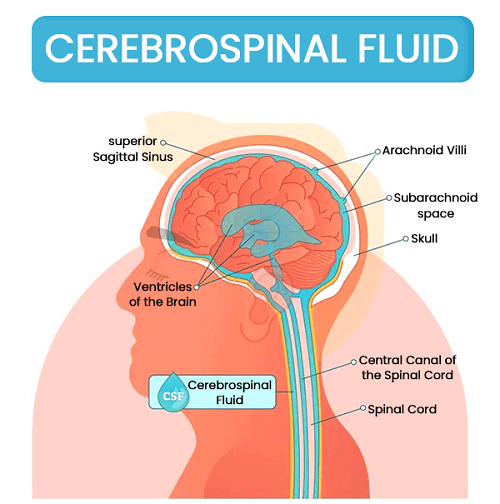What is the full form of CSFCSF: Cerebrospinal FluidCSF stands for Cerebrospinal Fluid. It is a clear and colorless fluid that is found in and around the brain and spinal cord. Each bodily process, including organ function, muscle movement, and even intelligent planning and thinking, is guided and controlled by the nervous system. 
The choroid plexus, a group of neurons deep within your brain, generates the fluid. The average person's body contains about 150 millilitres of fluid or about two-thirds of a cup. The colourless fluid circulates around one's brain and spinal cord, protecting them, transporting needed supplies from one's blood, and eradicating waste products from brain cells. As a matter of fact, this fluid can aid our doctors in deciding what is wrong with certain diseases. Where is it used?Doctors can measure many compounds in the cerebrospinal fluid through CSF analysis. It helps detect various disorders related to the brain, spinal cord, etc. Such as
CSF analysis is more effective than blood tests in understanding CNS symptoms. However, collecting a spinal fluid sample is more difficult than collecting a fluid blood sample. Collecting the raw sample from the spinal canal with a needle needs a great expert knowledge of the spine's anatomy and a thorough understanding of the underlying brain or spinal conditions that may increase the risk of complications from the procedure. Procedure for taking Sample
Risks Associated with the TestA spinal tap carries minimal threat. Whenever the needle is inserted, patients might feel a slight pinch or pressure. One could also feel some stiffness or discomfort in the back where the needle was injected after the test. Apart from that, people could experience headaches or mild bleeding at the wound site. The headache could persist for several hours and even for a week or longer, but the doctor would recommend treatment to reduce the pain and discomfort. Interpretation of ResultsSeveral different tests on the sample may be performed as part of CSF analysis. So, based on the tests which have been conducted, the readings on the test results may differ. The physician may explain the significance of those results. The CSF analysis results may generally indicate that you have a brain or spinal cord infection, an autoimmune disease like multiple sclerosis (MS), or some other disorder. Further tests will probably be required by the doctor to confirm the diagnosis.
Next TopicFull Form
|
 For Videos Join Our Youtube Channel: Join Now
For Videos Join Our Youtube Channel: Join Now
Feedback
- Send your Feedback to [email protected]
Help Others, Please Share










